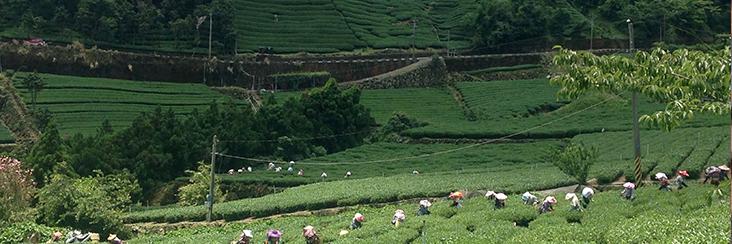
Central Taiwan Spring Tea Harvest 2016: A Pictorial

Stopping by our friend's house in Phoenix Village, Lugu around 5 pm on the day that he harvested his original family plot of tea just behind his house, his mom (now in her 70's) appeared from behind the house carrying her tea basket, and sat down to remove the small metal strips taped to her fingers. The harvest was finished by early afternoon, but not to her satisfaction. The hired team of pickers left a considerable amount of new growth on the plants, as they are paid by weight, and the smaller leaves weren't worth their time. So Mrs. Chen spent all afternoon combing the entire plot for this neglected new growth. Her efforts amounted to about 6 kg of fresh leaves, which makes about 1.5 kg of tea.

Days later, we visited our source of Dong Ding Oolong late evening day one of their spring harvest. This father and son team are the most skilled and dedicated traditional tea makers we know. Everything about their residential farm and production methods is what Eco-Cha is inspired to support and represent.


Below is a roadside snapshot of the "gateway" into Alishan tea country from the northwest, via Caoling and entering Taihe Township. Andy keeps boasting about how he can ride here from his house without hitting a single traffic light!
 Below is a sneak preview of the tea farming community we are visiting. There is a residential tea factory run by two brothers who each have small tea plots of their own, and cooperate with their neighbors during harvest time to process each others' seasonal harvests.
Below is a sneak preview of the tea farming community we are visiting. There is a residential tea factory run by two brothers who each have small tea plots of their own, and cooperate with their neighbors during harvest time to process each others' seasonal harvests.

And here is Andy checking out the younger brother's responsibly and well cultivated plot of Qing Xing Oolong that was harvested about 10 ten days prior.

Below is the older brother's plot that he has been practicing sustainable farming on in the last several years. He only uses natural fertilizers and administers pesticides just once early in the growing season so that the leaf buds will not be destroyed by pests before they develop into leaves. Afterwards, he uses an organic live enzyme called "Cai 18 Jun" invented and patented by a local university's pioneer in natural farming to prevent microbes from affecting the tender new growth. This garden is the highest on the hillside and surrounded by trees on two sides. We found this use of the land and its produce more interesting than the more conventionally farmed plots in the background on the far ridge.

Now, to offer a broader view on the farms above, this is a shot taken from across the valley, further south and east. The farms shown above are barely visible in the foothills of the massive ridge in the background, on the north end of the Alishan mountain range. The second shot is just a 30° turn to the left, showing the road we just rode up leading up to Zhangshuhu and the turnoff to Ruifeng.


We stopped looking for some sort of little snack before drinking even more tea on our next visit. This "help yourself" kettle was in front of a tiny shop with no sign that offered basic sundries like instant noodles, a few cooking supplies, and old school brand biscuits and cold drinks — all we needed. But as we munched our biscuits and drank a sports drink, we acknowledged how this kettle is a real life example of Eco-Cha's name in Chinese, 一口茶 meaning "a sip of tea". These three words are embedded in the local traditional culture as the expression of offering any passerby or thirsty traveler the humblest and most essential hospitality — a drink of tea, or water as the case may be.

And here is Andy with his old friend Mr. Xu, who he met some 15 years ago in his early explorations of this area. Mr. Xu cultivates a very small plot of tea that he exclusively offers to his guests in his homestyle B&B. We knew him before he opened the B&B and enjoyed his tea immensely, but we're still glad to just visit his gorgeous home and enjoy the country hospitality when we can.

We stood on his veranda and chatted about all kinds of things in our unannounced (Mr. Xu's phone was turned off that morning!) visit after a few years, while casually watching the harvesting scene below, just another day in the life here.

Our visit was too short, but we left feeling good after an overdue visit with an old friend. As we rode back down from his family's highest settlement on the mountainside above Zhangshuhu, we saw many crops being harvested under clear sunny skies — perfect weather for harvest. The tea produced on this mountain has become renowned due to its ideal climate and environment. But like many areas, it has expanded a great deal, and finding farm and factory operations that suit our style is becoming challenging, but still possible. We appreciate it all the more when we find a family run farm that has not expanded into high volume production, and this exploration of rural tea country has been our labor of love for decades.



